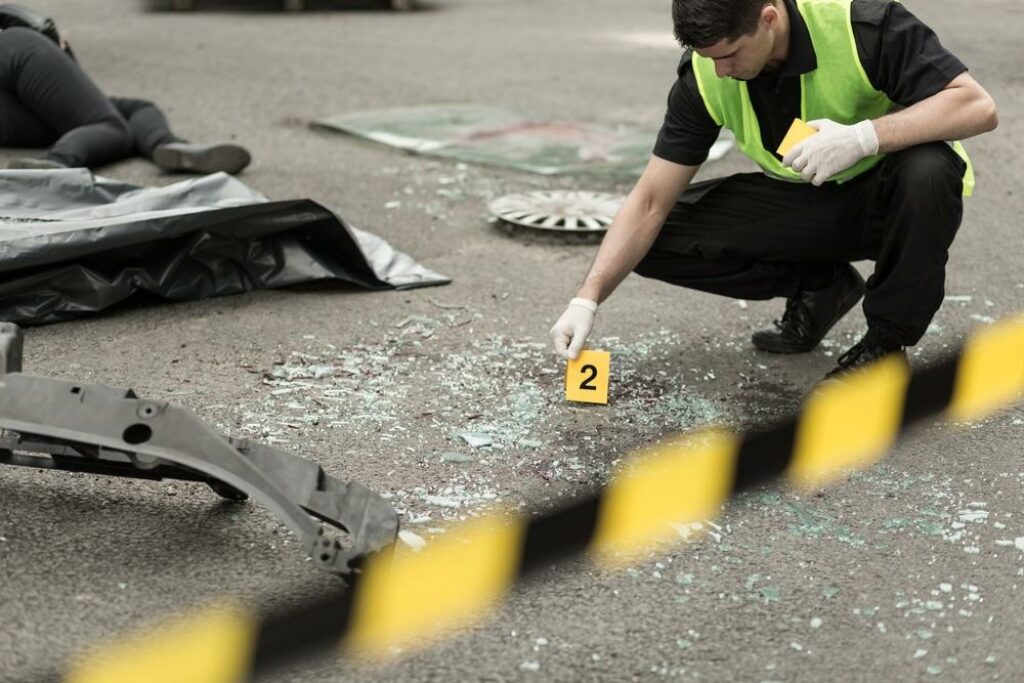
How to Become a Crime Scene Investigator
Most people associate police work and other law enforcement activities as finding, arresting and convicting the bad guys. But first they have to know who exactly are the criminals and how to prove it in court. That’s where crime scene investigators play their important part.
Related Topics (Sponsored Ads):
Crime scene investigation is a fascinating and intellectually stimulating field that requires a unique blend of scientific knowledge, attention to detail, and a passion for solving complex puzzles. Crime scene investigators (CSIs) play a crucial role in the criminal justice system by collecting and analyzing physical evidence to help solve and prevent crimes. This career path offers individuals an opportunity to contribute to the pursuit of justice and make a tangible difference in their communities. This article will delve into the steps and requirements for becoming a crime scene investigator, including educational prerequisites, essential skills, and job prospects in this dynamic and challenging profession.

Suitability for the Role
This exciting career is well-suited for individuals who possess a keen interest in forensic science, a strong inclination towards problem-solving, and the ability to work meticulously under pressure. The role demands individuals who are detail-oriented, methodical, and possess excellent observational skills. Moreover, a CSI should have a deep sense of integrity and a commitment to upholding the highest ethical standards, as their findings often play a pivotal role in legal proceedings. Additionally, individuals considering this career should be prepared for the emotional demands of the job, as they will regularly encounter distressing and confronting scenes.
Educational Requirements
The path to becoming a CSI typically begins with obtaining a bachelor’s degree in forensic science, biology, chemistry, criminal justice, or a related field. Some agencies may also consider candidates with degrees in other disciplines, provided they have completed coursework in forensic science and related areas. It’s essential to research the specific educational requirements of the law enforcement agencies or forensic laboratories where you aspire to work, as qualifications may vary between organizations.
In addition to a relevant bachelor’s degree, aspiring CSIs may benefit from pursuing specialized training programs or certifications in crime scene investigation, evidence collection, and forensic techniques. These programs often provide hands-on experience in processing crime scenes, analyzing evidence, and utilizing advanced forensic technology. Moreover, some agencies may require candidates to complete internships or gain practical experience in a related field to enhance their credentials.
Skill Requirements
Individuals looking to work in this field should possess a diverse set of skills to excel in this demanding role. Proficiency in scientific principles and methodologies is essential for analyzing evidence, understanding forensic techniques, and interpreting complex data. Strong critical thinking and problem-solving abilities are also vital, as CSIs must assess crime scenes methodically, identify relevant evidence, and draw logical conclusions from their findings. Additionally, excellent communication skills, both written and verbal, are crucial for documenting findings, preparing reports, and collaborating with law enforcement professionals and legal authorities.
Furthermore, attention to detail, the ability to remain composed in high-pressure situations, and a commitment to maintaining the integrity of evidence are indispensable qualities for success in this field. CSIs should also be adaptable and open to learning new technologies and techniques, as advancements in forensic science continually shape the practices and methodologies used in crime scene investigation.
Licensing and Certification
While specific licensing requirements for crime scene investigators vary by jurisdiction, many agencies encourage or mandate certification through professional organizations such as the International Association for Identification (IAI) or the American Board of Criminalistics (ABC). These certifications typically require candidates to meet certain educational and experience criteria and pass rigorous examinations to demonstrate their proficiency in forensic science and crime scene investigation. Obtaining professional certification can significantly enhance an individual’s credibility and employability in this field .
Job Prospects
The job prospects for crime scene investigators are expected to be favorable in the coming years, driven by the increasing reliance on forensic evidence in criminal investigations and legal proceedings. The Bureau of Labor Statistics (BLS) projects a steady growth in employment opportunities for forensic science technicians, which includes crime scene investigators, with a projected 14% increase in job openings from 2019 to 2029. This growth is attributed to the growing awareness of the importance of forensic evidence in solving crimes, as well as advancements in forensic technology that expand the scope of evidence analysis and interpretation.
Additionally, as law enforcement agencies and forensic laboratories continue to enhance their capabilities in evidence collection and analysis, the demand for skilled and qualified crime scene investigators is expected to rise. However, competition for positions in this field is anticipated to remain strong, emphasizing the importance of obtaining relevant education, training, and practical experience to stand out in a competitive job market.
Career Progression and Advancement
After gaining experience in the field, there are many opportunities for career advancement and specialization. Experienced CSIs may progress to supervisory roles, such as crime scene investigation unit managers or forensic laboratory directors, where they oversee the work of other investigators, manage resources, and contribute to strategic decision-making in their respective organizations. Furthermore, some CSIs may choose to specialize in specific areas of forensic science, such as DNA analysis, ballistics, or digital forensics, by pursuing advanced training and education in their chosen specialty.
Conclusion
A career as a crime scene investigator offers a compelling and fulfilling path for individuals with a passion for forensic science, a meticulous eye for detail, and a commitment to upholding justice. By obtaining the necessary education, honing essential skills, and gaining practical experience, aspiring CSIs can position themselves for success in this dynamic and important profession. For those who are drawn to the intersection of science and law enforcement, the career of a crime scene investigator holds immense potential for personal and professional fulfillment.




